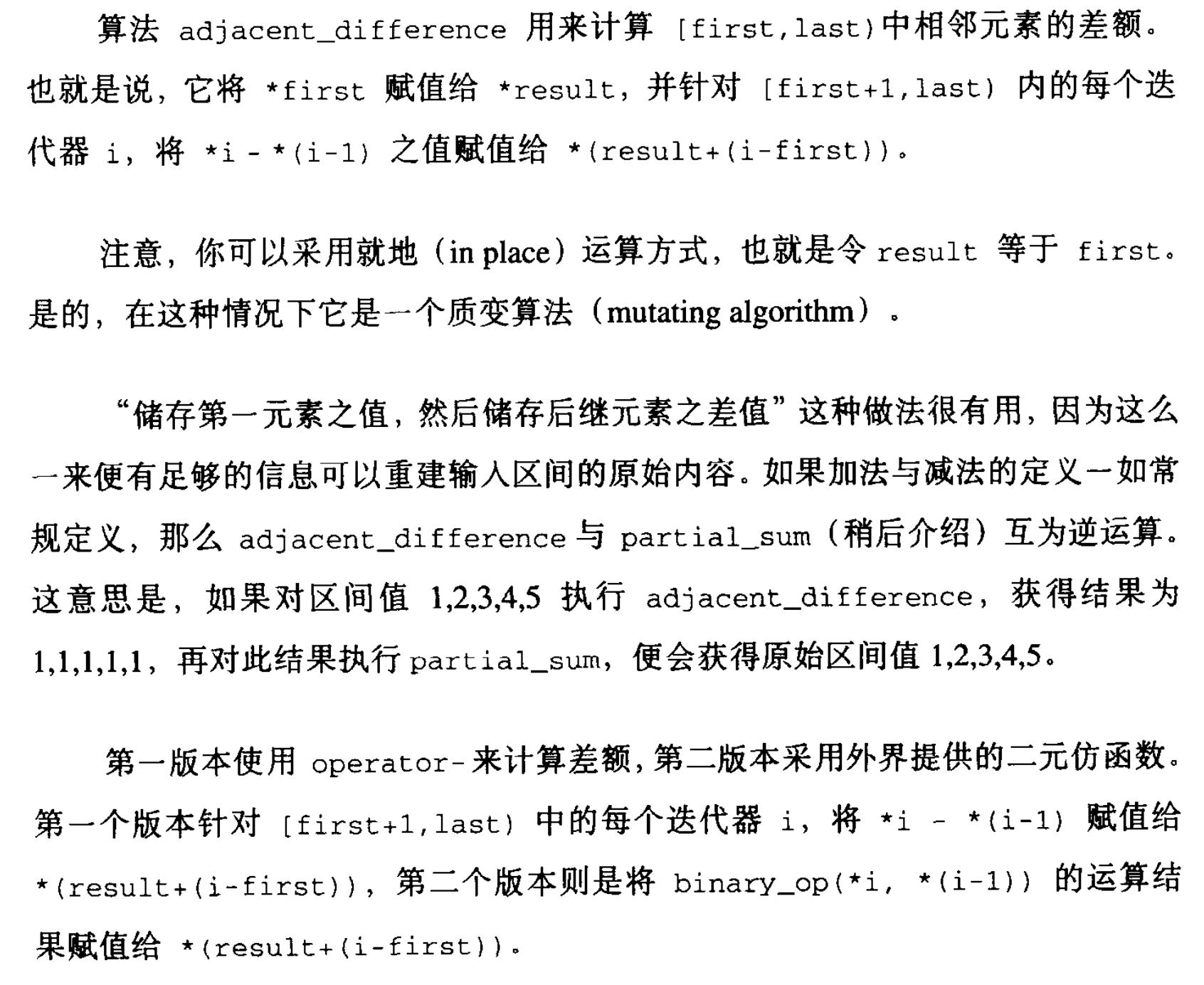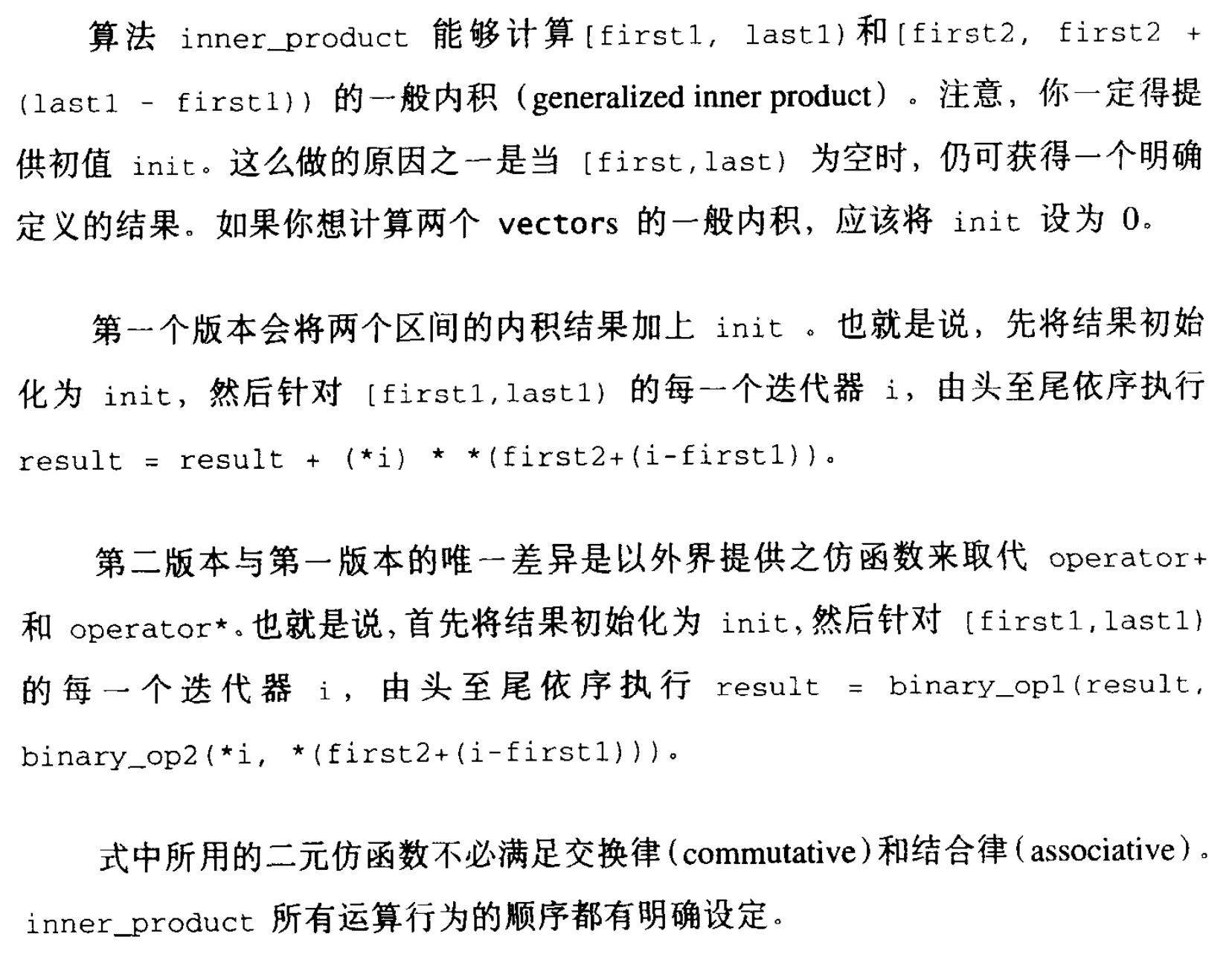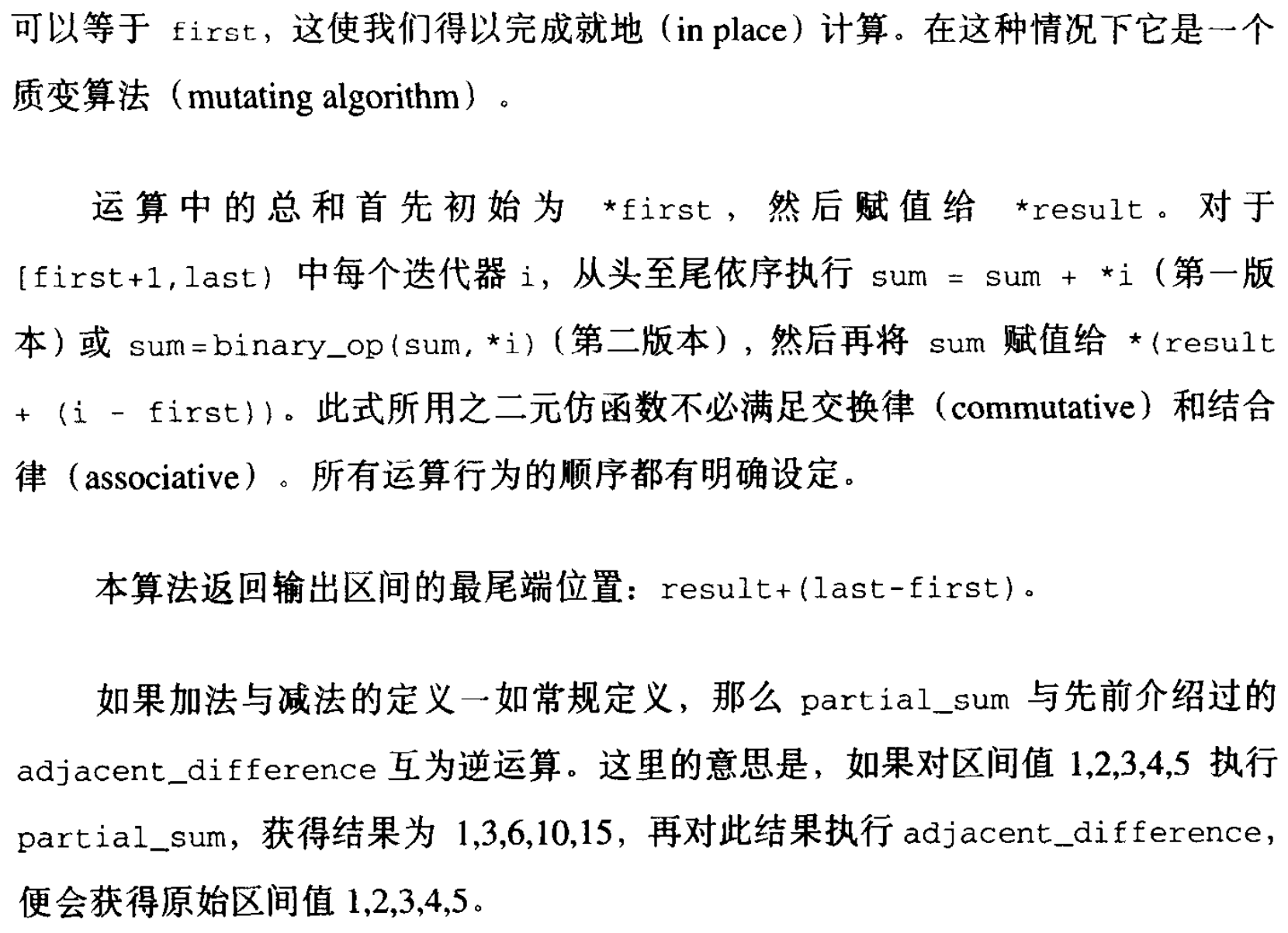
accumulate
介绍
template <class InputIterator, class T>
T accumulate (InputIterator first, InputIterator last, T init);
template <class InputIterator, class T, class BinaryOperation>
T accumulate (InputIterator first, InputIterator last, T init,
BinaryOperation binary_op);


1
2
3
4
5
6
7
8
9
|
template <class InputIterator, class T>
T accumulate (InputIterator first, InputIterator last, T init)
{
while (first!=last) {
init = init + *first; // or: init=binary_op(init,*first) for the binary_op version
++first;
}
return init;
}
|
举例
1
2
3
4
5
6
7
8
9
10
11
12
13
14
15
16
17
18
19
20
21
22
23
24
25
26
27
28
29
30
31
32
|
// accumulate example
#include <iostream> // std::cout
#include <functional> // std::minus
#include <numeric> // std::accumulate
int myfunction (int x, int y) {return x+2*y;}
struct myclass {
int operator()(int x, int y) {return x+3*y;}
} myobject;
int main () {
int init = 100;
int numbers[] = {10,20,30};
std::cout << "using default accumulate: ";
std::cout << std::accumulate(numbers,numbers+3,init);
std::cout << '\n';
std::cout << "using functional's minus: ";
std::cout << std::accumulate (numbers, numbers+3, init, std::minus<int>());
std::cout << '\n';
std::cout << "using custom function: ";
std::cout << std::accumulate (numbers, numbers+3, init, myfunction);
std::cout << '\n';
std::cout << "using custom object: ";
std::cout << std::accumulate (numbers, numbers+3, init, myobject);
std::cout << '\n';
return 0;
}
|
adjacent_difference
介绍
template <class InputIterator, class OutputIterator>
OutputIterator adjacent_difference (InputIterator first, InputIterator last,
OutputIterator result);
template <class InputIterator, class OutputIterator, class BinaryOperation>
OutputIterator adjacent_difference ( InputIterator first, InputIterator last,
OutputIterator result, BinaryOperation binary_op );

1
2
3
4
5
6
7
8
9
10
11
12
13
14
15
16
|
template <class InputIterator, class OutputIterator>
OutputIterator adjacent_difference (InputIterator first, InputIterator last,
OutputIterator result)
{
if (first!=last) {
typename iterator_traits<InputIterator>::value_type val,prev;
*result = prev = *first;
while (++first!=last) {
val = *first;
*++result = val - prev; // or: *++result = binary_op(val,prev)
prev = val;
}
++result;
}
return result;
}
|
举例
1
2
3
4
5
6
7
8
9
10
11
12
13
14
15
16
17
18
19
20
21
22
23
24
25
26
27
|
// adjacent_difference example
#include <iostream> // std::cout
#include <functional> // std::multiplies
#include <numeric> // std::adjacent_difference
int myop (int x, int y) {return x+y;}
int main () {
int val[] = {1,2,3,5,9,11,12};
int result[7];
std::adjacent_difference (val, val+7, result);
std::cout << "using default adjacent_difference: ";
for (int i=0; i<7; i++) std::cout << result[i] << ' ';
std::cout << '\n';
std::adjacent_difference (val, val+7, result, std::multiplies<int>());
std::cout << "using functional operation multiplies: ";
for (int i=0; i<7; i++) std::cout << result[i] << ' ';
std::cout << '\n';
std::adjacent_difference (val, val+7, result, myop);
std::cout << "using custom function: ";
for (int i=0; i<7; i++) std::cout << result[i] << ' ';
std::cout << '\n';
return 0;
}
|
inner_product
介绍
1
2
3
4
5
6
7
8
9
|
template <class InputIterator1, class InputIterator2, class T>
T inner_product (InputIterator1 first1, InputIterator1 last1,
InputIterator2 first2, T init);
template <class InputIterator1, class InputIterator2, class T,
class BinaryOperation1, class BinaryOperation2>
T inner_product (InputIterator1 first1, InputIterator1 last1,
InputIterator2 first2, T init,
BinaryOperation1 binary_op1,
BinaryOperation2 binary_op2);
|

1
2
3
4
5
6
7
8
9
10
11
|
template <class InputIterator1, class InputIterator2, class T>
T inner_product (InputIterator1 first1, InputIterator1 last1,
InputIterator2 first2, T init)
{
while (first1!=last1) {
init = init + (*first1)*(*first2);
// or: init = binary_op1 (init, binary_op2(*first1,*first2));
++first1; ++first2;
}
return init;
}
|
举例
1
2
3
4
5
6
7
8
9
10
11
12
13
14
15
16
17
18
19
20
21
22
23
24
25
26
27
28
29
|
// inner_product example
#include <iostream> // std::cout
#include <functional> // std::minus, std::divides
#include <numeric> // std::inner_product
int myaccumulator (int x, int y) {return x-y;}
int myproduct (int x, int y) {return x+y;}
int main () {
int init = 100;
int series1[] = {10,20,30};
int series2[] = {1,2,3};
std::cout << "using default inner_product: ";
std::cout << std::inner_product(series1,series1+3,series2,init);
std::cout << '\n';
std::cout << "using functional operations: ";
std::cout << std::inner_product(series1,series1+3,series2,init,
std::minus<int>(),std::divides<int>());
std::cout << '\n';
std::cout << "using custom functions: ";
std::cout << std::inner_product(series1,series1+3,series2,init,
myaccumulator,myproduct);
std::cout << '\n';
return 0;
}
|
partial_sum
1
2
3
4
5
6
|
template <class InputIterator, class OutputIterator>
OutputIterator partial_sum (InputIterator first, InputIterator last,
OutputIterator result);
template <class InputIterator, class OutputIterator, class BinaryOperation>
OutputIterator partial_sum (InputIterator first, InputIterator last,
OutputIterator result, BinaryOperation binary_op);
|


1
2
3
4
5
6
7
8
9
10
11
12
13
14
15
|
template <class InputIterator, class OutputIterator>
OutputIterator partial_sum (InputIterator first, InputIterator last,
OutputIterator result)
{
if (first!=last) {
typename iterator_traits<InputIterator>::value_type val = *first;
*result = val;
while (++first!=last) {
val = val + *first; // or: val = binary_op(val,*first)
*++result = val;
}
++result;
}
return result;
}
|
iota
template <class ForwardIterator, class T>
void iota (ForwardIterator first, ForwardIterator last, T val);
1
2
3
4
5
6
7
8
9
|
template <class ForwardIterator, class T>
void iota (ForwardIterator first, ForwardIterator last, T val)
{
while (first!=last) {
*first = val;
++first;
++val;
}
}
|






